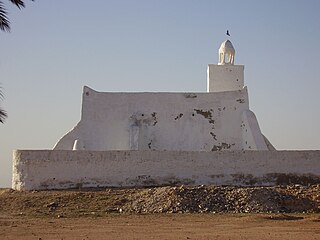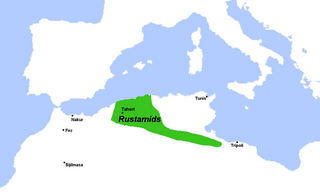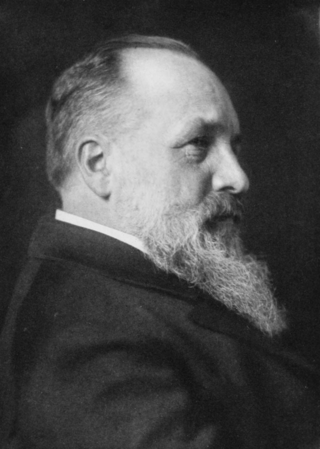Related Research Articles
The Kharijites were an Islamic sect which emerged during the First Fitna (656–661). The first Kharijites were supporters of Ali who rebelled against his acceptance of arbitration talks to settle the conflict with his challenger, Mu'awiya, at the Battle of Siffin in 657. They asserted that "judgment belongs to God alone," which became their motto, and that rebels such as Mu'awiya had to be fought and overcome according to Qur'anic injunctions. Ali defeated the Kharijites at the Battle of Nahrawan in 658, but their insurrection continued. Ali was assassinated in 661 by a Kharijite dissident seeking revenge for the defeat at Nahrawan.

The Ibadi movement or Ibadism is a branch inside Islam, which many believe is descended from the Kharijites. The followers of Ibadism are known as the Ibadis or, as they call themselves, The People of Truth and Integrity.

The Rustamid dynasty was an Ibadi Persian dynasty centered in present-day Algeria. The dynasty governed as a Muslim theocracy for a century and a half from its capital Tahert until the Ismaili Fatimid Caliphate defeated it. Rustamid authority extended over what is now central and western Algeria, parts of southern Tunisia, and the Jebel Nafusa and Fezzan regions in Libya as far as Zawila.

Islam is the state religion in Oman, introduced during the Prophet Muhammad's lifetime in the early 7th century. Muhammad appointed Amr ibn al-As as governor, who remained until Muhammad's death in 632 CE. Amr and Sa'id ibn Aws al-Ansari delivered Muhammad's letter to the Al-Julanda brothers; the rulers of Oman, inviting them to embrace Islam. This peaceful mission marked the beginning of Islam in Oman. Today, 85.9% of Oman's population is Muslim, with slightly over 45% following Sunni Islam, and around 45% Ibadi Islam, with the other 5% identifying as Shia Muslims.
Andrew Lawrence Rippin, was a Canadian scholar of Islamic studies and Quranic studies.

Carl Eduard Sachau was a German orientalist. He taught Josef Horovitz and Eugen Mittwoch.

Wilferd Ferdinand Madelung FBA was a German author and scholar of Islamic history widely recognised for his contributions to the fields of Islamic and Iranian studies. He was appreciated in Iran for his "knowledgeable and fair" treatment of the Shia perspective. In the obituary of the Institute of Ismaili Studies (London) where Madelung worked his last years, it reads: "With particular reference to religious schools and movements in early Islam, his studies, based on a vast array of primary sources, have enriched the discipline’s understanding of almost every major Muslim movement and community – not only early Imami Shi‘ism and the later developments of Twelver, Ismaili and Zaydi Islam but also the lesser known aspects of Sunni, Khariji and the Mu‘tazili schools of theology and philosophy."
Gerald R. Hawting is a British historian and Islamicist.

Michael Allan Cook FBA is a British historian and scholar of Islamic history. Cook is the general editor of The New Cambridge History of Islam.

Laura Veccia Vaglieri (1893–1989) was an Italian orientalist who made significant contributions to Arabic and Islamic studies in Italy. She was a scholar and served as a professor at the University of Naples "L'Orientale". Her research focused on the historical and institutional analysis of the Arab and Muslim world, and she authored several books on these topics. Additionally, Veccia Vaglieri wrote numerous articles on early Islam and on Ibadism. Her work also included contributions to the Encyclopaedia of Islam and the history of research on Ibāḍī studies.
Ibadism, or the Ibadi school of Islam, which has followers in Oman and elsewhere, has been the subject of much academic study. Much of the earlier writings from within the Islamic world presented Ibadism as a heresy. Western academic interest in Ibadism began in the mid-19th century, when translations of Ibadi texts and other literature began to become available. French and Italian scholars focussed mainly on Ibadism in North Africa, while John C. Wilkinson and other British scholars have studied it in Oman, where few texts were accessible until the 1970s.
André Paul Armand Nègre was a French diplomat born in Castelmoron-sur-Lot in south-western France.
Ibāḍī theology refers to the study of God within the Ibāḍī branch of Islam, and shares a path with Islamic theology. Although the school was founded in Basra, modern-day Iraq, its followers subsequently sought refuge in Oman, Yemen, Hadramawt in the southeast peninsula of Arabia, and North Africa. Though largely ignored by the mainstream of Arab and Muslim scholarship, and scarcely tapped by Orientalist research, there does exist a continuous tradition of Ibāḍī scholarship throughout the centuries to this day.
John Craven Wilkinson is a scholar of Islamic studies specializing in Ibadi studies. He is a British expert in the field of Ibadi studies.
Valerie Hoffman is an academic scholar on Islamic studies expertise on religion, anthropology of Islam and Ibadi studies.
Ziaka Angeliki is an academic scholar on Islamic studies expertise on Byzantine studies, Ibadi Studies and Shia Studies.
Dale F. Eickelman is an American anthropologist with an expertise on the Middle East. He is the Ralph and Richard Lazarus Professor of Anthropology and Human Relations at Dartmouth College.
Nafi ibn al-Azraq ibn Qays al-Hanafi al-Bakri was the leader of the Kharijite faction of the Azariqa during the Second Fitna.
Al-Salt bin Malik was the seventh Imam of Oman, ruling from 851 until his deposition in 885.
Abu Bilal Mirdas ibn Udayya al-Tamimi was the leader of quietist Kharijites of Basra during the early years of the Umayyad Caliphate. He was the brother of Urwa ibn Udayya, one of the instigator of the Kharijite movement at the Battle of Siffin, in which Abu Bilal himself participated. After the defeat of the Kharijites at the Battle of Nahrawan in 658, he adopted political quietism and opposed the extremist Kharijites. In 680, in response to persecution by the Umayyad governor Ubayd Allah ibn Ziyad, Abu Bilal rose in rebellion and was killed in 681. His piety, military exploits, and death, which was seen by many as martyrdom, immortalized him among the later Kharijite circles. He is counted among the imams of the extinct Sufrism sect of the Kharijites and is venerated in Ibadism to this day.
References
- 1 2 One Hundred and Seventy-Sixth Final Exercises (PDF). University of Virginia. 2005-05-22. p. 24. Archived from the original (PDF) on 2021-09-20. Retrieved 2021-02-11.
- ↑ Adam Gaiser (2017-09-05). "Curriculum Vitae" (PDF). Retrieved 2019-06-26.
- ↑ Custers, Martin H. (2016). Al-Ibāḍiyya: A Bibliography. 3 (Second revised and enlarged ed.). Hildesheim-London-N.Y.: Olms Publishing. p. 256.
- 1 2 "Adam Gaiser | Department of Religion". religion.fsu.edu. Retrieved 2019-06-26.
- ↑ Custers, Martin H. (2016). Al-Ibāḍiyya: A Bibliography. 3 (Second revised and enlarged ed.). Hildesheim-London-N.Y.: Olms Publishing. pp. 256–259.